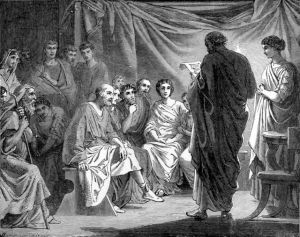Christian-History.org does not receive any personally identifiable information from the search bar below.
The Christian and the Law of Moses
This teaching from the early Church on the Law of Moses is crucial. Nonetheless, it is completely forgotten. No one discusses it or knows about it.
Ad:
Our books consistently maintain 4-star and better ratings despite the occasional 1- and 2-star ratings from people angry because we have no respect for sacred cows.
Despite that, this early Christian teaching …
- … is obviously Scriptural
- … answers questions that most Christians wonder about
- … makes the very difficult Sabbath issue suddenly very simple
 Spring in Selmer, TN
Spring in Selmer, TNLet's jump right into it.
Every section matters! Sorry, there's no good way to shorten it because most sections on this page will be new to you.
Don't jump to conclusions and quit reading! It's going to sound for a little while like I'm suggesting we all start keeping the Law of Moses. Anyone who's read the writings of the early Church knows they didn't do that. Ignatius, one of the most respected leaders in the early Church, appointed to his position by the apostle John, called Law-keeping "absurd":
It is absurd to profess Christ and to Judaize. For Christianity did not believe into Judaism, but Judaism into Christianity. (Magnesians 10); at that link, only the top paragraph is from Ignatius; the second is a later addition)
You've never heard this teaching on the Law of Moses before, I promise. It's what everyone believed for centuries. You'll love it!
"I Did Not Come To Abolish the Law of Moses"
There are two verses that really throw us today. How could they both be true? They were no problem to the early Christians. They are:
- Christ is the end of the Law for righteousness for everyone who believes. (Rom. 10:4)
- Do not think that I came to abolish the Law. I did not come to abolish, but to fulfill. (Matt. 5:17)
We have two problems at the root of our misunderstanding of these verses. One, we don't realize the context of Matthew 5:17, which we'll address below, and, two, we don't speak New Testament Greek.
Pretty much every Bible version I've looked at translates pleroo in Matt. 5:17 as "fulfill." Normally, when most Bible versions agree, you can be confident the translation is accurate.
(Don't be fooled by those guys who look up a word in Strong's Concordance or some other lexicon and argue for some unique translation that supports their pet doctrine. If you can't find any Bible translations to back you up, then you're making a mistake in the original language.)
In this case, however, I feel pretty comfortable arguing that if the native speakers of a language understood a verse differently than we do, then we've got it wrong.
Here's how Irenaeus, a native Greek-speaker from Smyrna in A.D. 185 (or so), understood Matthew 5:17:
The Lord did not abrogate the natural [precepts] of the Law, … but … he extended and fulfilled them. (Against Heresies IV:13:1)
A little further on he says that the words of Christ are the words of one "fulfilling, extending, and affording greater scope" to the Law of Moses.
What Does It Mean to Fulfill and Extend the Law of Moses?
I mentioned that we don't realize the context of Matthew 5:17. Irenaeus introduces us to that as well:
… that he extended and fulfilled [the natural precepts of the Law] is shown from his words: "For … it has been said to them of old time, 'Do not commit adultery.' But I say to you that everyone who has looked upon a woman to lust after her has already committed adultery with her in his heart." (ibid.)
In other words, Matthew spends the whole rest of chapter five explaining what Jesus meant by "fulfilling, extending, and affording greater scope" to the Law of Moses.
He means that we are not only to avoid murder, but anger, hate, and insults as well. We should not merely follow the rules concerning divorce; we shouldn't divorce at all. We should not only fulfill our oaths, but we should follow through on our every word. We should not only love our neighbors, but our enemies as well.
Once the context is pointed out, it seems rather obvious what "extending and fulfilling" means. But …
How Does Any of This Resolve the Contradiction with Paul?
First, let's be clear that Paul does not object to the use of the Law of Moses. In fact, when discussing a Christian teacher's right to support, he appeals to the Law:
Do I say these things as a man, or does the Law not say the same thing? (1 Cor. 9:8)
 Sunset over highway 64 in Selmer
Sunset over highway 64 in SelmerI know this has image has nothing to do with this page, but isn't it beautiful?
But when Paul appeals to the Law, he does not do so the way the Jews might. He appeals to the Law the way Jesus taught us to. He takes it and fulfills, extends, and gives greater scope to it.
It is written in the Law of Moses, "You shall not muzzle the ox that treads out the corn." Does God care about oxen? Or does he rather say it for our sake? It is for our sake, no doubt, that it is written, so that he who plows should plow in hope. (1 Cor. 9:9-10).
Paul dares to say that God doesn't care about oxen and that he didn't send that law for the sake of oxen. A little earlier, he had said the same thing about food. "Foods for the stomach, and the stomach for foods, but God will destroy both it and them" (1 Cor. 6:13).
In other words, Paul, even while he is appealing to the Law of Moses, appears to be abolishing the Law of Moses. The command is about oxen, but he says God doesn't care about oxen. But it's only appearance. In reality, he is not abolishing the law; he is extending and fulfilling it by applying it where God really wants it applied.
Is that true? Is it really acceptable to apply a law figuratively like this?
Apparently so. Jesus does it, too.
The Appearance of Abolishment
It is not just Paul who appears to be abolishing laws. Jesus does as well:
Don't you realize that nothing coming from outside and entering a man can defile him because it doesn't enter his heart but his stomach? (Mark 7:18-19)
Why would Jesus say this if he did not come to abolish the Law of Moses?
The answer is in the fulfilling, extending, and affording greater scope.
The food laws are not abolished, but like the law about the muzzling of oxen, God doesn't care about the literal sense. He doesn't write laws for oxen, and he doesn't write laws for food. He has something greater in mind.
The main part of the food law is that we should not eat meat unless it comes from an animal that chews the cud and parts the hoof. If God doesn't care about what meat we eat, what does he care about?
A Christian named Barnabas, from the early 2nd century, answers that question for us. His answer is typical of the Christians of his day.
What does he mean then? That we ought to join ourselves to those who fear the Lord, those who meditate in their heart upon the commandments which they have received, … who ruminate upon the Word of the Lord. But what does "cloven-footed" mean? That the righteous man walks in this world but looks forward to the holy state to come. (Letter of Barnabas 10)
You will find similar interpretations of the food laws throughout the writings of the early Church.
There are other laws that though they appear to be abolished have rather gained a spiritual application by being 'brought to fullness' and extended:
- We don't make oaths any more because we fulfill our every word.
- We don't rest on the 7th day any more because we are able to sanctify every day in the rest of Christ. (A link is coming quickly for this because it's such a controversial and emotional topic.)
- We aren't physically circumcised anymore because we receive a spiritual circumcision of our hearts in Christ.
The list of such laws could be huge. One of the greatest blessings of this teaching is that it opens the Law of Moses to the Christian, who is able to interpret it by the Spirit and understand the significance of the entire Law.
Personally, I was excited to find out that the food laws do apply to us—but spiritually. I am only supposed to partake of those who meditate on the Word of God and who separate from the world. These are the ones with whom the Church should have fellowship, just as Paul has taught us in 1 Corinthians 5:9-13.
What About the Contradiction?
Why Did Paul Say Christ Is the End of the Law?
 An artist depiction of Paul's letter being read in an early Church congregation
An artist depiction of Paul's letter being read in an early Church congregationPaul didn't say Christ is the end of the Law of Moses. Paul said Christ is the end of the Law for righteousness. This is important.
Paul is emphasizing that righteousness will not come from the Law of Moses. The Law is holy, perfect, and good, but we can't keep it (Rom. 7). So it will not produce the righteousness of God.
But something else will produce the righteousness of God, and that something is faith in Christ.
In [the Gospel] the righteousness of God is revealed from faith to faith. (Rom. 1:17, emphasis added)
That righteousness is the same righteousness that the Law of Moses was meant to produce. It's just that the Law of Moses did not have the power to overcome our flesh. Only Jesus Christ, giving himself as an offering for sin, could overcome the sin in our flesh:
For what the Law could not do because it was weak through the flesh, God did. By sending his own Son in the likeness of sinful flesh and as an offering for sin, he condemned sin in the flesh, so that the righteousness of the Law might be fulfilled in us, who do not walk by the flesh, but by the Spirit. (Rom. 8:3-4, emphasis mine)
The Righteousness of the Law
So Paul tells us that the righteousness of the Law will be brought about in us if we walk by the Spirit.
Does this mean that we should keep the Law of Moses with all its ordinances?
As we saw above, absolutely not; not if that means keeping the Law in its fleshly, literal form.
There is a reason that Jesus said our righteousness must exceed that of the Pharisees (Matt. 5:20). There is a reason that his statement is in the context of filling and expanding the Law of Moses.
Jesus really meant for us to live out the things he said in Matthew 5. The Pharisees didn't murder; Christians, however, don't hate. The Pharisees (for the most part) avoided adultery; Christians avoid lust.
Jesus was pretty serious about this. He said that if our righteousness does not exceed that of the Pharisees, we will "certainly not" enter the kingdom of heaven.
Spiritual vs. Carnal Law-Keeping
Understand that the Old Covenant was made for a fleshly nation. With some exceptions, the Jews were not given the Spirit of God under the Old Covenant.
Therefore, Jewish warfare was carnal. They actually killed neighboring nations, and they fought with earthly weapons. Christians, however, fight with spiritual weapons, and their war is not against neighboring nations, but against spiritual wickedness in heavenly places.
The Law, as it was given to the Jews, was like a flat balloon. Jesus blew that balloon up. He inflated, expanded, and afforded greater scope to it.
As Paul puts it, the Law, as given to the Jews, was just a shadow of things to come. The body casting that shadow, he says, is from Christ (Col. 2:17).
As Jesus puts it, the Law, as given to the Jews, was adjusted to take into account the hardness of their hearts (Matt. 19:8), which were not renewed by the Spirit of God, as they would be under the New Covenant. It is only into the fresh wineskins of hearts made new in Christ that the new wine of the law of Christ can be poured.
Law of Christ?
The early Christians spoke regularly of the Law of Christ. We American Christians don't even know it's in the Bible. The writer of Hebrews says:
For the priesthood being changed, there is, of necessity, a change also of law. (Heb. 7:12)
It is true that this new law of Christ is a law "of the Spirit of Life" (Rom. 8:2). However, that Spirit of Life leads us to fulfill "the righteousness of the Law."
We modern Christians commonly argue that Galatians is written against the Law of Moses. So it is. However, it is written against the Law of Moses as a means to righteousness. It is not written against the righteousness prescribed by the fulfilled, expanded Law brought by Christ:
Are you so foolish? Having begun in the Spirit, are you now being made perfect by the flesh? (Gal. 3:3)
In this verse, Paul argues that the flesh—a reference to trying to follow the Law of Moses—will never make you perfect (or complete). However, he is not arguing against being made perfect. He simply argues that this perfecting must happen by the Spirit of God, not by the Law.
Spiritual vs. Carnal Law-Keeping, Part 2
Following the Spirit of God will lead us into the righteousness of the Law. However, that righteousness is not the fleshly righteousness of the literal Law of Moses as understood by the Jews. It will lead us into the fulfilled, expanded Law of Christ.
This means, as we saw above, that we will not be circumcised in the flesh. We will be circumcised in heart. We will not keep a Saturday Sabbath, nor a Sunday Sabbath. We will keep a "perpetual Sabbath" (Justin, Dialogue with Trypho 12, c. A.D. 150). We do this by "properly resting," which The Letter of Barnabas describes as being made new and working righteousness in the Lord (ch. 15).
When we keep the Law spiritually, we will not care about food. We will know that both food and stomach will perish. Instead, we will guard our fellowship, partaking only of those who chew the cud of the Word of God and who part from the world. We will no longer offer animal sacrifices, which never meant anything to God (Ps. 51:16; Jer. 7:22-23). Instead, we will offer ourselves as living sacrifices (Rom. 12:1-2).
This is the only righteousness that will exceed that of the Pharisees and please God.
It cannot be emphasized enough that this can only happen through faith, grace, and the Spirit of God. The whole point of the New Covenant is that we cannot trust ourselves. We're supposed to have learned that from the Old Covenant.
In us, that is in our flesh, nothing good dwells (Rom. 7:18). Our flesh will only be put to death through the Spirit (Rom. 8:13). It is the law of the Spirit of Life in Christ Jesus that puts to death the law of sin and death (Rom 8:2). Nothing else can do that.
Conclusion
Much more could be said on this subject. My head is spinning with comments I'd love to make about Christ putting away the enmity between Jew and Gentile caused by the "handwriting of ordinances." However, correcting all our misconceptions concerning the Law would take much more than one web page.
This page is meant to help us get over the seeming contradiction between Jesus in Matthew 5 and Paul in Romans and Galatians. We have misunderstood both Paul and Jesus.
I pray that this page might be a foundation for your own study and understanding of the apostles' letters, as found in our New Testament. I pray that your study of the apostles' teaching will make you love the spiritual, expanded law of Jesus Christ, and to delve, spiritually, into the Law of Moses, which was written not for the Jews, but for us, upon whom the end of time has come (1 Cor. 10:11).
Early Church History Newsletter
You will be notified of new articles, and I send teachings based on the pre-Nicene fathers intermittently.
When you sign up for my newsletter, your email address will not be shared. We will only use it to send you the newsletter.